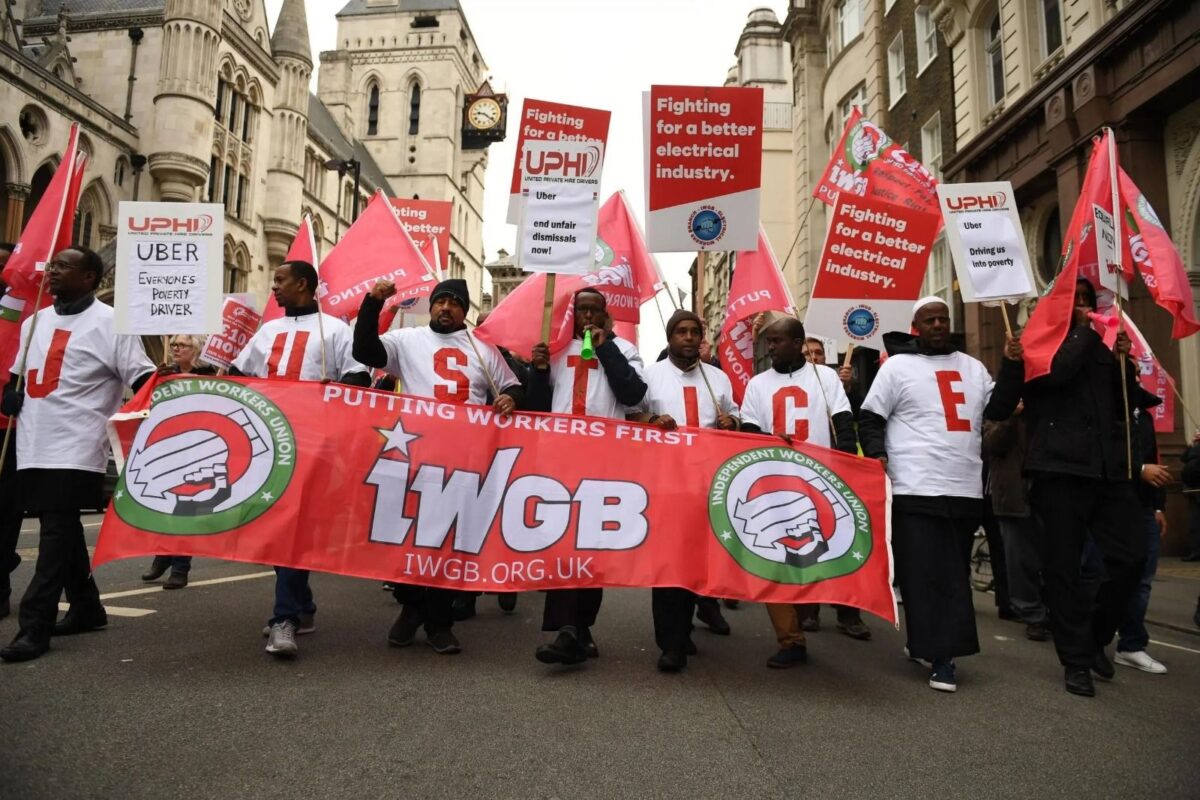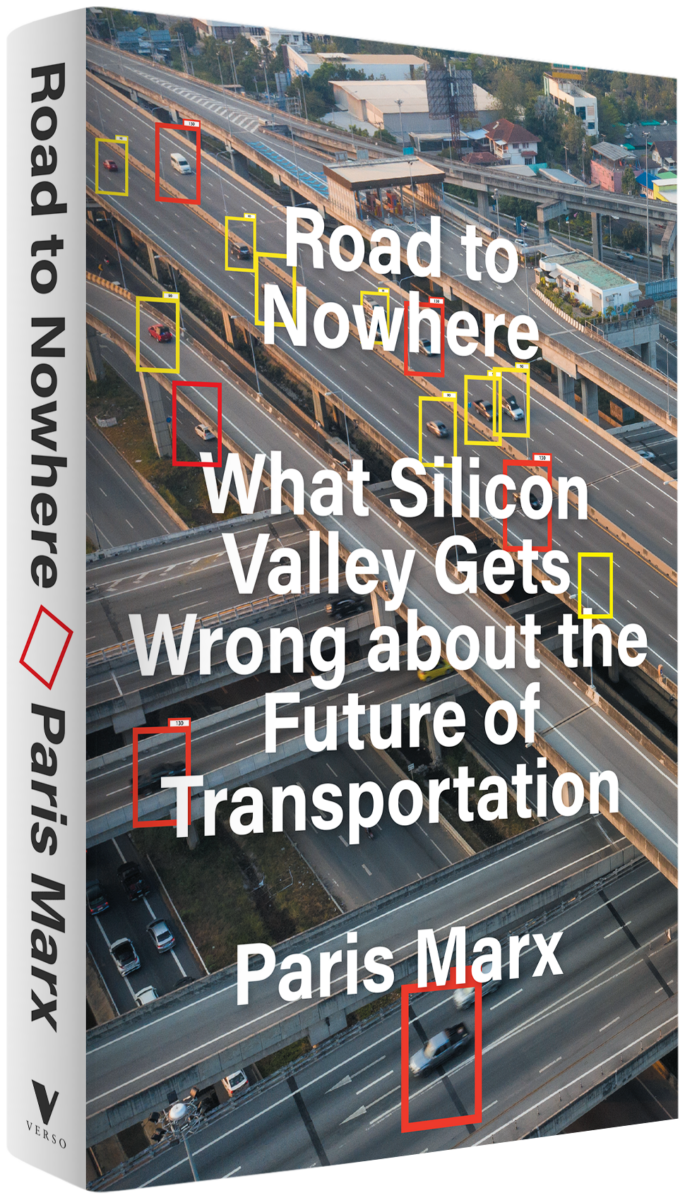Source > People and Nature
Unleashing Uber on cities would cut car ownership, because ride-hailing would be cheaper, Travis Kalanick, then Uber’s chief executive, claimed in 2015. It would reduce traffic congestion, allow car parks to be converted to other uses, and complement public transport with its “last mile” service.
Investors bought into Kalanick’s story, that Uber’s innovative app would produce these benefits, to the tune of billions of dollars. Central to his patter was the claim that Uber was a tech company, not a transport company (since denied by courts in the UK and New Zealand), and his crusade against local government regulations and the “taxi cartel”.

In Road to Nowhere, Paris Marx not only unmasks these falsehoods, but also explains Silicon Valley’s place in the broader crisis of capital, and the social, economic and ecological damage it does.
Marx recounts how Uber expanded in the US after the 2008 recession, flooding the market with drivers, to whom it offered incentives that were then withdrawn, while pay was cut.
Uber’s predatory pricing, financed by stock exchange investors, drove traditional taxi companies out of business. Taxi drivers’ incomes plummeted and their lives fell apart, triggering a slew of suicides.
The post-recession environment provided both a large pool of precarious labour and what Marx calls “incredible technological optimism” (page 109). Central to Uber’s strategy was an assault on cities’ transport regulations and on the labour conditions won over decades by taxi drivers’ union power. Uber and the other technology companies, cheered on by US conservatives and libertarians, deployed technologies as weapons in the class war.
In the midst of the gathering climate crisis, Uber’s new technology drove greenhouse emissions upwards. Directly contradicting Kalanick’s promises, the Uber model put more vehicles on the road.

For a start, the app incentivised drivers to go out at peak times. Moreover, researchers have shown that Uber “not only induces more travel, but encourages people who would otherwise take transit, cycle, or walk to their destination to instead get in a hailed vehicle” (page 99).
Ride-hailing pushes public transport into a vicious circle. More cars means buses getting stuck in jams; more people look for cheaper and quicker transport and go for Uber or Lyft; people, especially those with above-average income, take an Uber instead of walking. The environmental footprint of trips skyrockets.
Results monitored by transport researchers: San Francisco, 2010-16, the hours that drivers spent stuck in traffic rose by 62%, and vehicles’ average speeds dropped by 13%; ride-hailing vehicles were “the biggest factor” driving congestion. New York, 2013-17, the combined number of taxis and ride-hailing vehicles rose by 59%, even as the latter drove many of the former out of business; their combined mileage rose by more than one third.
Despite its success in trashing labour regulation and traffic reduction measures, Uber was losing money. Mountains of it: about $25 billion, between 2016 and 2020.

Uber not only transformed the taxi industry at drivers’ expense, and flooded the streets with cars that worsened traffic: it also “cycled through several bold visions to keep investor money flowing, as it failed to profitably deliver its ride-hailing service”, Marx writes (page 184). It burned through billions, dabbling in micromobility services and with failed attempts to automate drivers and launch flying cars.
But losing money does not mean Uber produced no benefits for capital, Marx argues. “Even if Uber eventually dies”, its contribution to the class struggle in rolling back gig economy workers’ rights will remain – potentially “a far bigger win in the long term” for capital, if not reversed by government action.
Marx, a technology journalist by trade (and host of the Tech Won’t Save Us podcast), contextualises the tech bros’ actions in the social processes of which they are part. They “move fast and break things”; they undermine labour rights and state regulation; their wealth is deployed in ways that exacerbate the climate crisis.
This suited government, Marx argues. In the post-recession decade, the venture capitalists who financed tech companies’ loss-leading adventures “acted as the US’s central planners”, as the New York Magazine writer Eric Levitz put it. Marx writes:
While the political right criticised government decisions to provide support to particular companies and sectors, they ignored how a powerful group of wealthy men educated at Ivy League institutions were in control of multi-billion-dollar funds that they used to cherry-pick companies – that could corner particular market segments and fiance them while they recorded substantial losses, […] driving out competition.
It was not just Uber. Google and Tesla did most in the early 2010s to promote the “dream of ubiquitous autonomous vehicles”, Marx writes – a fantasy that is not being realised (page 138).
The dream was not just about self-driving cars. It was larger and more insidious: the idea that “we could all step back and let the tech sector solve the problems that have build up over the past century of bad political decisions about transportation” – problems that have cost millions of lives and devastated communities by spreading cities out for the sake of cars.
But autonomous vehicles are “not the solution to the problems created by automobiles, because they themselves are still automobiles”. They take up too much space; they encourage car-oriented urban development patterns; and they bring a whole range of new vulnerabilities.
One of the most cringe-worthy stories Marx tells is of Elon Musk’s ludicrous Boring Company, that aimed to drive tunnels under cities. Musk dismissed the concept of induced traffic – i.e. the fact that more roads produce more traffic, developed by decades of transport research – as “one of the most irrational theories I’ve ever heard”, and vowed to build “super safe, Earthquake-proof tunnels under cities to solve traffic”.
The plans came almost to nothing, as did those for flying cars.
Marx shows how such schemes reflect the privilege of Silicon Valley’s movers and shakers. To them, transport policy is about clearing the way for moneyed car owners to move faster (and break more things, I suppose.)
Electric vehicles, unlike driverless ones, do actually work, Marx argues – but large-scale adoption would bring new environmental dangers caused by demand for metals and other materials. Cars are cars, and tackling the climate crisis means reducing their numbers:
Instead of trying to have personal electric vehicles match the scale of personal gas or diesel vehicles, the emphasis should instead be on getting people to shift from driving to taking transit and cycling, while building more walkable communities where necessities are closer to home (page 87).
Marx doesn’t cover the role of the big car manufacturers, who use their foothold in electric vehicle making to greenwash their unsustainable main business, just as oil and gas companies do with their miniscule investments in renewables.
Are there motoring journalists out there who will do as thorough a job on Ford, VW, Nissan et al as Marx does on Silicon Valley? If so, they will be swimming against the tide. As the tech bros careered disastrously into urban transport systems, journalists, along with ride-hailers, bought the story they were selling. Marx writes:
In the years after Uber’s launch, and especially its move into competition with the taxi industry, the media adopted the language of Silicon Valley to echo marketing claims that innovative new technologies were being developed to disrupt traditional industries for the better (page 94).
I recommend Road to Nowhere not only for what it says about transport, but for its approach to technologies more generally.
Marx understands that gadgets – be they ride-hailing apps and electric vehicles that work, or flying cars that don’t – need to be considered in their social context. He also compares this generation of technologies with the people-damaging way that cars were introduced to rich-country cities in the early 20th century.
Further, Marx shows how the relationship of private capital and the state counts here; and how the assumptions inscribed in our culture, that technofixes will solve the problems capitalism has piled up for us, are as dangerous as the Silicon Valley whizz kids’ delusions.
Road to Nowhere shows how those whizz-kids are empowered by crisis-ridden capitalism to develop technologies in ways that hurt us all. The question, “how can technologies be shaped to benefit people, not to harm them?”, can only really get asked in the course of our fight against capital.
In a final, forward-looking, chapter, Marx welcomes the measures taken by Paris, Oslo and other cities to de-centre cars, but insists that we need to go further. We need publicly-supported mobility apps, not Uber apps. Transport systems must become an expression of “public abundance”, as opposed to inequality and private wealth. Computerised transport technologies must work together with urban planning, which is also about technologies (even if they aren’t all flashy gizmos).
Road to Nowhere is far ahead of the depressing pile of texts that put a “left” gloss on techno-optimism, rather than understanding its social function, such as the books by Holly Jean Buck and Andreas Malm embracing geoengineering – to say nothing of the crass “eco modernism” of Jacobin magazine’s Leigh Phillips.
Socialism desperately needs an understanding of technology in its social context. Without this, we will never learn how to develop the technological systems – including urban transport systems that minimise the car’s role – that we need, to live a better life and to avert dangerous climate change. SP, 23 January 2023.
□ Read an excerpt from Road to Nowhere: The real futures tech is building
□ Road to Nowhere – publisher’s information
The Anti*Capitalist Resistance Editorial Board may not always agree with all of the content we repost but feel it is important to give left voices a platform and develop a space for comradely debate and disagreement.
Art Book Review Books Campism Capitalism China Climate Emergency Conservative Government Conservative Party COVID-19 Creeping Fascism Economics EcoSocialism Elections Europe Far-Right Fascism Film Film Review Fourth International France Gaza History Imperialism Iran Israel Italy Keir Starmer Labour Party Long Read Marxism Marxist Theory Migrants Palestine pandemic Protest Review Russia Solidarity Statement Trade Unionism Ukraine United States of America War Women

